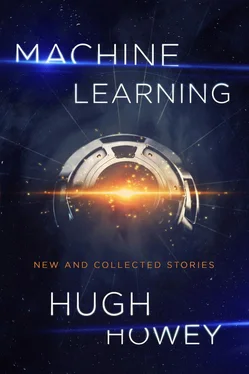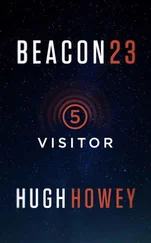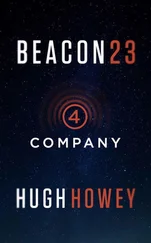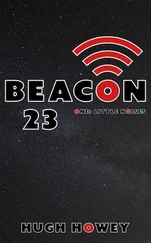The founders in the command room—no longer breathing—watched in silence. Hands clasped over mouths. Those who had harbored any doubts now believed. All was still. The only things that moved on the screens were the thin red rivulets trickling from noses and ears. There was no one left alive to cut away to, to change the view. And only those ten people huddled around the wire-webbed monitors were left to see.
“Kill it,” someone finally said, a terrible slip of the tongue.
Tracy watched as Dmitry fumbled with the controls for the panels. He accidentally changed channels on one of the sets, away from news and into the realm of reruns. There was a sitcom playing: a family around a dinner table, a joke just missed. A bark of canned laughter spilled from the speaker, the illusion that life was still transpiring out there as it always had. But it wasn’t just the laughter that was canned now. They all were. All of humanity. What little was left.
“Hey. Wake up.”
Dreams. Nothing more than dreams. A black ghost clawing away at her mother, a wicked witch burying her father and her sister. Tracy sat up in bed, sweating. She felt a hand settle on her shoulder.
“We have a problem,” someone said.
A heavy shadow, framed by the wan light spilling from the hallway.
“Anatoly?”
“Come,” he said. He lumbered out of her small room deep in the mountain. Tracy slid across that double bunk, a bed requisitioned for two, and tugged on the same pants and shirt she’d worn the day before.
The fog of horrible dreams mixed with the even worse images from their first day in the complex. Both swirled in her sleepy brain. Slicing through these was the fear in Anatoly’s voice. The normally unflappable Russian seemed petrified. Was it really only to last a single day, all their schemes to survive the end of the world? Was it a riot already? Orientation the day before had not gone well. Fights had broken out. A crowd had gathered at those four-foot-thick doors, which had been designed just as much to keep people in as to keep other dangers out.
Perhaps it was a leak. Air from the outside getting in. Tracy hurried down the hall barefoot, searching her lungs for some burn or itch, touching her upper lip and looking for a bleed. Her last thought as she caught up to Anatoly and they reached the command room together was that the cameras outside the crypt doors would be on, would reveal a lone man, inoculated to the sudden death but slowly dying anyway, banging feebly and begging to be let in—
“Everyone here?” Dmitry asked. The thin programmer scanned the room over his spectacles. There was no real leader among the founders. Tracy held some special status as the originator of the group, she who had found The Order. Anatoly was the man who had coordinated the lease and planning of the facility. But Dmitry was the brightest among them, the tinkerer, the one who had deactivated the machines in their blood. Of them all, he seemed to most enjoy the thought of being in charge. No one begrudged him that.
“What is this?” Patrice asked. She knotted her robe across her waist and crossed her arms against the chill in the room.
“The program,” Dmitry said. “It… has changed.”
Someone groaned. Tracy rubbed the sand from her eyes. The gathered braced for Dmitry’s usual technobabble, which was bad enough when wide awake.
“Five hundred years,” he said. He pushed his glasses up his nose and looked from face to face. “Not six months. Five hundred years.”
“Until what?” Sandra asked.
“Until we can go out,” Dmitry said. He pointed toward the door. “Until we can go out.”
“But you said—”
“I know what I said. And it’s all in the book. It says six months. But the program unspooled yesterday. It’s dynamic code, a self-assembler, and now there’s a clock set to run for five hundred years.”
The room was quiet. The recycled air flowing through the overhead vent was the only sound.
“How are you reading this new program?” Igor asked. “Do you have those buggers in here?” He nodded toward the silver pod with all its tubes and wires.
“Of course not. The antennas we put up, I can access the mesh network the machines use to communicate. Are any of you listening to me? The program is set to run for five hundred years. This book”—he pointed to the tome sitting on the large round table—“this isn’t a guide for the entire program. It’s just for one small part of it, just one shift. I think the cryo-pods are maybe so they can—”
“So how do we change it?” Anatoly asked. “You can tap into the network. How do we turn it all off? So we can leave right now? Or set it back to six months?”
Dmitry let out his breath and shook his head. He had that exasperated air about him that he got when any of the founders asked questions that belied fundamental flaws in their understanding of what, to him, were basic concepts. “What you’re asking is impossible. Otherwise I would have done it already. I can program the test machines in my lab, but overcoming the entire network?” He shook his head.
“What does that mean for us?” Tracy asked.
“It means we have a year’s worth of food,” Dmitry said. “Eighteen months, maybe two years if we ration. And then we all slowly die in here. Or…”
“Or what?”
“Or we die quickly out there.”
Sharon slapped the table and glared at Dmitry. “We’ve got fourteen men in the infirmary and another eight in restraints from telling everyone we’ll be here for six months and that everyone they know is now dead. Now you’re saying we have to tell them that we lied? That we brought them here to starve to death? ”
Tracy sank into one of the chairs. She looked up at Dmitry. “Are you sure about this? You were wrong about the clock the last time. You were a few seconds off. Maybe—”
“It was tape delay,” Dmitry said, rubbing his eyes beneath his glasses. “All broadcasters use a time delay. I wasn’t wrong. I’m not wrong now. I can show you the code.”
One of the founders groaned.
“What were you saying about the pod?”
“I think this is a manual for a single shift,” Dmitry said. “And the pod is for—”
“You mean the icebox?” Patrice asked.
“Yes. The cryo-unit is to allow them to stagger the shifts. To last the full five hundred years. I looked over one of the requisitions reports we intercepted, and it all makes sense—”
“Does our pod work?” Anatoly asked.
Dmitry shrugged. “Nobody wanted me to test it, remember? Listen, we have a decision to make—”
“What decision? You’re telling us we’re all dead.”
“Not all of us,” Tracy said. She rested her head in her palms, could see that witch from her dreams, shoveling soil on thousands of writhing bodies, hands clawing to get out.
“What do you mean?” Patrice asked.
“I mean we’re the same as them.” She looked up and pointed to the dead monitors, which had once looked out on the world, on the people with their anthems who had doomed them all. “We have the same decision to make. Our little world, our little mountain, isn’t big enough for all of us. So we have a decision to make. The same decision they made. We’re no better than them.”
“Yes,” Dmitry said. “I figure we have eighteen months’ worth of food for five thousand mouths. That gives us enough for fifteen people for five hundred years.”
“Fifteen people? To do what?”
“To survive,” Dmitry said. But the tone of his voice said something more somber and sinister. Tracy tried to imagine all that he was implying. Someone else said it for her.
“And kill everyone else? Our families?”
“No way,” someone said. Tracy watched her partners, these founders, fidget. It was the orientation all over again. A fight would break out.
Читать дальше












